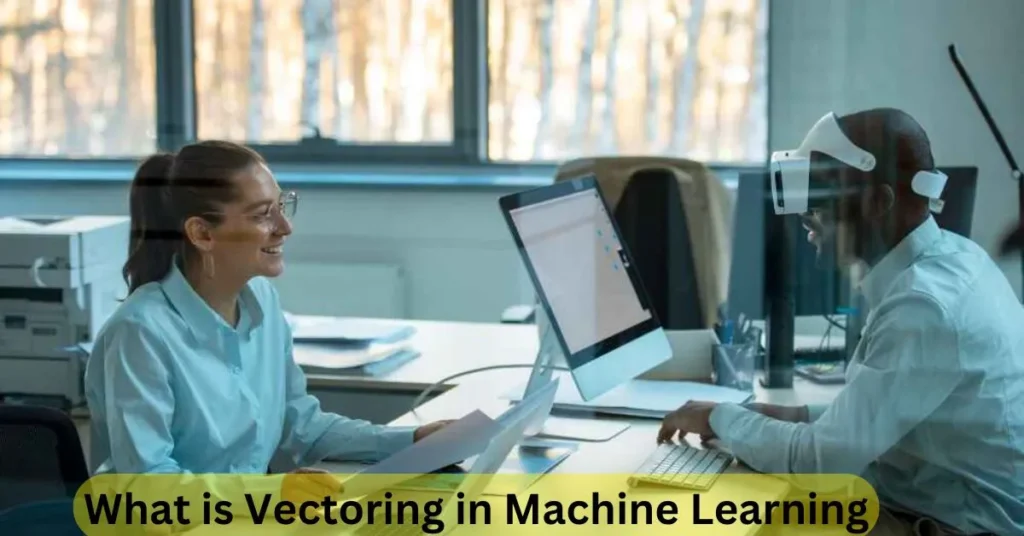Introduction
In today’s world, What is Vectoring in Machine Learning (ML) is remodeling industries by making computers smarter and more green. But have you ever wondered, What is Vectoring in Machine Learning and how it allows machines to recognize records? The mystery lies in vectoring—a way that allows machines to technique and analyze enormous amounts of information.
In this article, we’ll write down What is Vectoring in Machine Learning, why it matters, and the way it’s used throughout distinctive industries. Plus, we’ll explore actual global applications, offer a clean-to-comply guide, and explain why groups have to spend money on advanced facts solutions.
Understanding Vectoring in Machine Learning
At its middle, vectoring is the technique of converting facts into numerical representations (vectors). These vectors permit machines to apprehend patterns, make predictions, and automate choices.
Think of vectoring as translating specific types of statistics—along with text, pictures, or audio—into a not-unusual language (numbers). Just as people use words to talk, machines use vectors to recognize and system records.
Why Does Vectoring Matter?
- Enhances machine studying accuracy by using structuring statistics successfully.
- Improves pattern recognition in fields like finance, healthcare, and cybersecurity.
- Optimizes garage and retrieval of big datasets, lowering processing time.
How Vectoring Works: A Step-via-Step Guide
Let’s stroll through a smooth example to recognize What is Vectoring in Machine Learning works in exercise.
Step 1: Converting Data into Numerical Format
Imagine you run an online shop, and also you need to analyze client opinions. Before a gadget can understand those reviews, it wishes to transform the textual content into numerical representations. This is performed with the use of techniques like:
- Bag of Words (BoW): Counts phrase frequency in a file.
- TF-IDF (Term Frequency-Inverse Document Frequency): Weigh phrases primarily based on importance.
- Word Embeddings (e.g., Word2Vec, GloVe): Converts words into vectors while retaining that means.
Step 2: Mapping Data right into a Vector Space
Once we’ve got numerical statistics, it’s mapped into a vector space—a multi-dimensional area in which similar information factors are positioned nearer collectively. This step is critical for pattern recognition.
For instance, if you have client evaluations announcing:
- “Great product, very beneficial!”
- “The product is high-quality, I like it!”
Both sentences might have comparable vector representations, permitting the gadget to classify them as wonderful comments.
Step 3: Applying Machine Learning Algorithms
Now that the data is established, the system getting to know fashions like neural networks, choice bushes, or aid vector machines (SVM)](https://en.Wikipedia.Org/wiki/Support_vector_machine) can manner it to generate insights, predictions, or guidelines.
Real-World Applications of Vectoring in Machine Learning
Vectoring isn’t just theoretical—it’s powering a number of the maximum exciting improvements across industries.

1. Healthcare: Diagnosing Diseases
Hospitals use vectoring strategies to investigate affected persons’ symptoms, suit them with clinical information, and expect ability illnesses. For instance, an AI gadget can examine symptoms beyond cases to become aware of feasible diseases early.
2. Finance: Fraud Detection
Banks rely on What is Vectoring in Machine Learning to locate fraudulent transactions. By reading spending patterns, AI can flag unusual pastimes and prevent monetary losses.
three. E-commerce: Personalized Recommendations
Ever puzzled how Amazon or Netflix is aware of what you’ll like? Their recommendation engines use vectoring to analyze past purchases or viewing history, presenting personalized guidelines.
4. Cybersecurity: Identifying Threats
Security systems convert community site visitors’ information into vectors, allowing AI to detect malicious hobby earlier than it reasons damage.
Why Businesses Should Invest in Advanced Vectoring Solutions
Save Time and Money
Companies waste hours sorting unstructured information. Vectoring automates this method, slicing prices and boosting efficiency.
Improve Decision-Making
With vectoring in device gaining knowledge, companies can make facts-driven selections that cause higher income and better client delight.
Ensure Data Security
By investing in answers like Solix Data Lake, organizations can protect touchy records whilst enhancing performance.
“Recent advancements, like those seen in Insitu Machine Learning Camsari, showcase how real-time vectoring can enhance AI’s ability to process and adapt to new data instantly, making machine learning models more dynamic and responsive.


